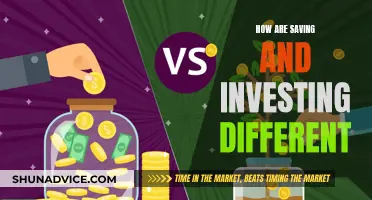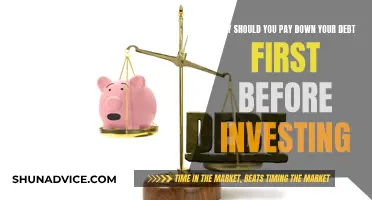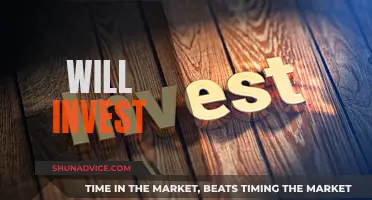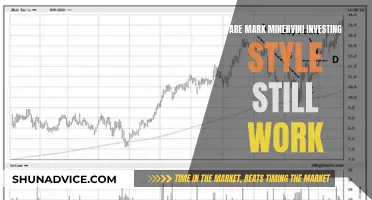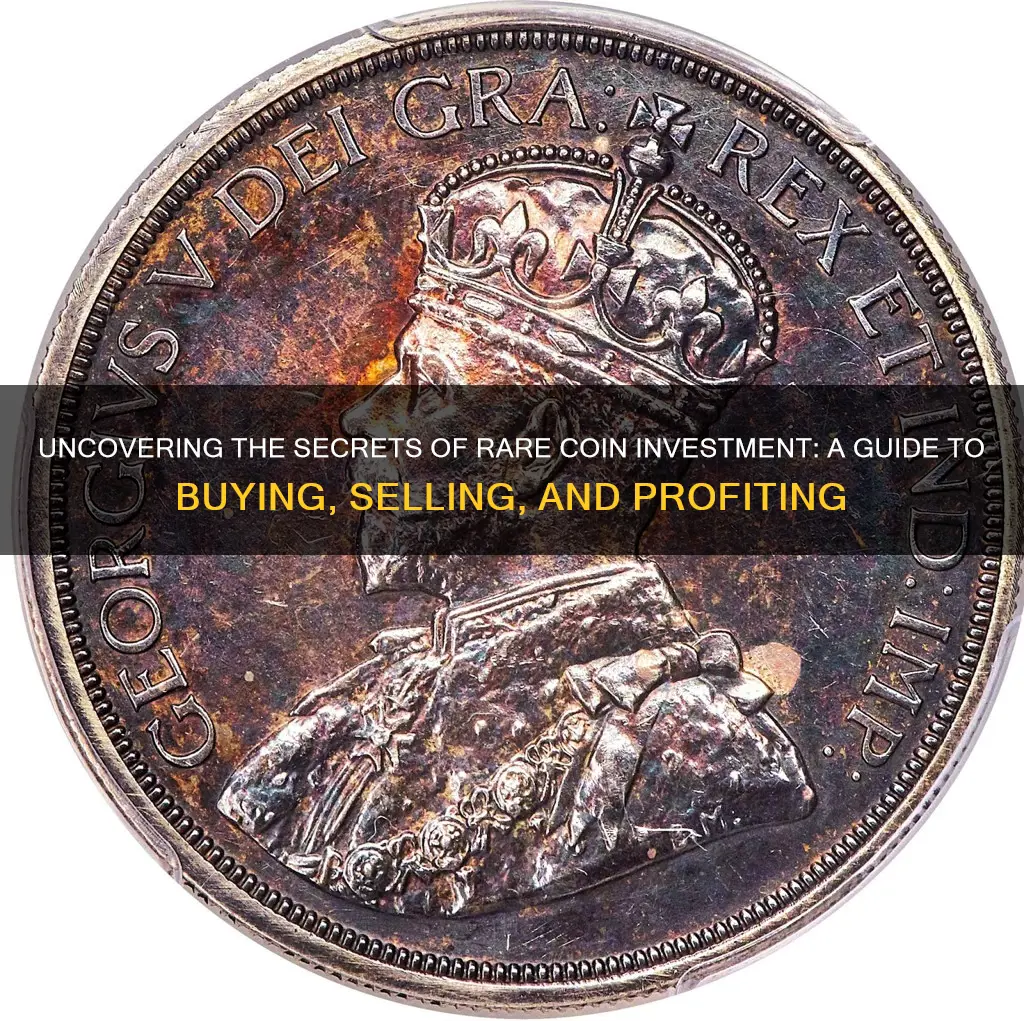
Rare coins are an interesting and potentially profitable investment. The first step to buying, selling, and investing in rare coins is to know what you have. Research the type of coin, its denomination, date, mint mark, approximate condition, errors, history, and provenance. Next, have your coins assessed by a professional appraiser to get an accurate estimate of their value.
When it comes to selling rare coins, there are several options. You can sell them to a coin dealer, at an auction, or through an online auction site. Coin dealers are experts and can help you sell your coins to a third-party buyer. They also have insider insight into the rare coin market, supply, and demand. Auctioning your rare coins can be a good option if you want to sell them to the highest bidder, but keep in mind that auction houses often charge fees and commissions. Online auction sites like eBay can be a quick way to sell your coins, but you may not get the best price.
If you're looking to buy and invest in rare coins, it's important to acquire knowledge before acquiring the coins. Educate yourself by reading books, articles, and coin value guides, such as The Red Book or The Grey Sheet. Seek out a mentor who can guide you in researching the value and potential future value of coins. Attend coin shows, join coin clubs, and talk to coin dealers to expand your network and gain access to investment-quality rare coins.
Remember, investing in rare coins is a long-term endeavour. It takes time and expertise to spot coins of truly exceptional value.
| Characteristics | Values |
|---|---|
| Rarity | The rarer the coin, the more valuable it is |
| Metal content | The value of a rare coin is above and beyond its underlying metal content |
| Age | Older coins are generally more valuable |
| Condition | The better the condition, the more valuable the coin |
| Authenticity | Authentic coins are more valuable than counterfeits |
| Grading | Coins are graded on a 70-point scale; the higher the grade, the more valuable the coin |
| Numismatic value | The value of a coin is influenced by how much coin collectors want it |
| Bullion value | The bullion value is the current market value of the metal in a coin |
| Wholesale value | The wholesale value of a coin may be substantially different from its market value |
| Market value | The market value of a coin can be determined by consulting auction results and pricing guides |
| Supply and demand | The value of a coin is influenced by supply and demand |
What You'll Learn

How to identify a rare coin
Identifying a rare coin can be a challenging task, but with some knowledge and practice, it can become easier. Here are some detailed instructions to help you identify a rare coin:
Examine the Coin's Physical Characteristics:
- Metal Content: Look at the metal composition of the coin. Older coins may contain precious metals like silver or gold, which can increase their value.
- Age: While age doesn't always equate to rarity, older coins with a lower mintage (number of copies produced) are generally more valuable.
- Condition: The condition of a coin is crucial to its value. Uncirculated or mint-condition coins with little wear and tear tend to be more valuable.
- Weight and Diameter: Measure the coin's weight and diameter, as these can help identify its authenticity and potential value.
- Colour: Observe the coin's colour, which can indicate the type of metal it's made of (e.g., golden for gold, silvery for silver, brown for copper).
- Shape: Most coins are circular, but some may have unique shapes, such as polygons approximating circles.
Inspect the Design Elements:
- Portrait/Image: Examine the portrait or main image on the coin. Look for any interesting marks, abnormalities, or errors, as these can increase a coin's rarity and value.
- Lettering: Carefully examine the lettering, paying attention to any missing, doubled-up, or unique inscriptions. Clean the coin if necessary, as dirt can disguise rarities.
- Mintmark: The date and mintmark are essential in diagnosing valuable rare coins. Look for errors or variations in these elements.
- Die Rotation: Check if the die rotation, or the angle at which the coin turns from top to bottom, is even. Any odd rotations can indicate a rare coin.
Utilize Resources and Tools:
- Catalogues and Databases: Use online catalogues, such as Numista, or apps like Coinoscope, to identify your coin by comparing it to images and descriptions in the database.
- Magnifying Glass: Use a magnifying glass or lens to closely inspect the coin's details, especially for smaller or intricate design elements.
- Online Search: Search for the year, country of origin, and main elements of the coin. If the coin is in a foreign language, identify the language first to aid your search.
- Reference Books: Consult reference books like "The Guide Book to United States Coins" (also known as the "Red Book") for comprehensive information on specific coins.
- Coin Dealers and Appraisers: Reach out to local coin dealers or appraisers for a professional opinion on the rarity and value of your coin. Ensure they are members of reputable organisations like the American Numismatic Association (ANA).
Cramer's Investing Club: Strategies and Secrets
You may want to see also

Where to find a coin dealer
When looking for a coin dealer, it is important to do your research to ensure you are consulting with an expert and honest dealer. Many of the people that appear under "coin dealers" in an online search are pawnbrokers, junk bullion buyers, or jewellers, who do not specialise in rare coins and may offer you a lower price.
To find an expert dealer, you can consult the Professional Numismatists' Guild (PNG) directory first. The PNG has very strict requirements for member dealers, and dealers are vetted to ensure their integrity.
Another source for finding a coin dealer is the American Numismatic Association's (ANA) Dealer Directory. The ANA is a non-profit organisation dedicated to educating and encouraging people to study and collect coins. All ANA-member coin dealers must agree to and abide by the ANA's Dealer Code of Ethics, so you can be sure of their integrity.
If you cannot find a local coin dealer through the PNG or ANA, you can check to see if there are any local coin clubs or coin shows in your area. Many local coin clubs sponsor monthly shows, where several dozen dealers will set up tables and buy and sell coins. If you cannot find a coin show yourself, then contact a local coin club to see if there are any coin shows nearby or a dealer that can help you.
If none of the above methods are productive, you can check the Yellow Pages, local newspapers, or online local news publications. These often have a "Coins" section in the classified ads where people will advertise to buy and sell coins on a private basis. However, beware that some of these may be unethical, so be sure to do your research first.
Finally, if you are just getting started with investing in rare coins, it is recommended that you connect with a mentor who can guide you through the process. You can also learn by reading books and articles, attending coin shows, or joining coin clubs.
Fisher Investments: Navigating the Retirement Conundrum
You may want to see also

How to grade a rare coin
Grading a rare coin involves assessing its condition and assigning a numerical value that indicates its rarity and value. The higher the grade, the rarer and more valuable the coin. While collectors are encouraged to grade their own coins, there are also third-party grading services that offer unbiased opinions on the condition of coins. These services employ professional numismatists with extensive knowledge and experience in coin grading.
Grading Scales
The most commonly used grading scale is the Sheldon scale, which ranges from 1 to 70, with 70 being a perfect, flawless coin, and 1 being a coin that is barely recognisable. The benchmarks on this scale are:
- Poor-1: Coin is identifiable only by its date and type.
- Good-4: Most to all detail is worn flat, and the rims are also worn, but most lettering is visible, if not particularly clear.
- Very Good-8: Design is worn but has some detail and is not flat. Legends are clearer than G4.
- Fine-12: Wear is noticeable, but the coin and most legends are still clear.
- Very Fine-20: Wear on the coin begins receding to the higher, finer points. Most of the low-level details are intact.
- Extremely/Extra Fine-40: The coin has light wear, but all details and lettering are sharp and clear. This is the first grade where coins may still have some luster.
- About Uncirculated-50: Wear is minimal, and other criteria, like luster, are more important.
- Uncirculated-60: All luster remains, although surface wear, spots, and scratches are present.
- Perfect Uncirculated-70: There are no traces of wear or contact marks on the coin.
Third-Party Grading Services
Third-party grading services assign a numerical grade to a coin based on its condition. The two most trusted coin grading companies are the Numismatic Guaranty Corporation (NGC) and the Professional Coin Grading Service (PCGS). These companies do not appraise coins or assign them a value; instead, they provide an unbiased opinion on the coin's condition, and it is then up to the market to decide what the coin is worth. Other reputable grading services include Independent Coin Graders (ICG), American Numismatic Association Certification Service (ANACS), and Certified Acceptance Corporation (CAC).
When to Use Third-Party Grading Services
Third-party grading services are typically used to grade high-end examples of older or rarer coins. These services are worth considering if you want to afford a rare coin a higher degree of prestige and protection. Additionally, if you are unsure about the value of your coin or whether it is worth grading, you can consult a professional grader or a coin shop for advice.
Cost of Grading Services
The cost of grading a coin can vary depending on the service, the type of coin, and the level of grading chosen. Grading a common coin can cost around $20, while grading a rare coin can cost up to $125. Annual memberships with grading services may also be required, with fees ranging from $39 to $69. Shipping and insurance costs for transporting the coin to and from the grading service should also be factored in.
Retirement Reality Check: Why You Should Start Investing Now
You may want to see also

How to find the value of a rare coin
The value of a rare coin is determined by its rarity, condition, appearance, and the demand in the market. The process of finding the value of a rare coin can be done in a few steps.
Identify the Coin
First, identify the coin by searching for the year and image on the coin. You can use Google to search for the year and main elements of the coin. If the coin is not in English, try to identify the language and search for it online. If there is no date on the coin and it has a rough texture, it is likely a hammered coin, which tends to be very rare and expensive. In this case, it is best to contact an appraiser. You can also use online catalogues, such as Numista, or a free app, such as Coinoscope, to identify the coin by taking a photo of it.
Assess the Coin's Value
The value of a coin is largely dependent on its condition. Therefore, it is important to assess the quality of the coin, which can range from "mint" (perfect) to "poor" (dirty or damaged). A coin that has never been used, known as an uncirculated coin, will tend to have a higher value. It is also worth noting that a dirty coin is often worth more than a cleaned-up version of the same coin.
To get a real-world price for the coin, you can check recently sold listings on eBay's dedicated section for collectible coins and currency. This will give you an idea of what people are currently paying for that type of coin.
Work with an Appraiser
You can also get your coin professionally appraised by a coin dealer or a coin assessor, who will give you an accurate, up-to-date value of the coin. They will take into account the coin's condition, as well as what similar coins have been selling for lately. It is recommended to use a PCGS-certified appraiser, as they tend to be the most reputable.
You can also send your coin to the PCGS (Professional Coin Grading Service) or NGC (Numismatic Guaranty Company) to have it graded. These two organisations are the most reputable coin grading services.
Additionally, you can contact your local numismatics society for help in identifying and valuing your coin.
Rights: A CMO Investor's Guide
You may want to see also

How to sell a rare coin
Selling a rare coin can be a tricky process, but if you do it right, it can be very rewarding. Here are the steps you should follow to get the best outcome:
Know Your Coin
Before you do anything else, it's important to know as much as you can about your rare coin. Look for information on the approximate condition, any errors or unexpected features, the history of the coin type and year, and the provenance of the coin. You can find much of this information online or in coin value books. However, keep in mind that the market value and wholesale value may differ from the values listed in these resources.
Have Your Coin Assessed by a Professional
A professional coin appraiser can give you a more accurate estimate of the value of your rare coin. They will consider various factors and provide you with an explanation of how they arrived at their valuation. This step is crucial, as it will help you understand the true value of your coin and make informed decisions in the next steps.
Decide on the Selling Method
There are several options for selling your rare coin, each with its own advantages and disadvantages. You can choose to sell it to a rare coin dealer, auction it off, or sell it through an online auction site. Here's an overview of each option:
- Rare Coin Dealer: Selling to an established and reputable coin dealer who is an expert in rare coins can be a wise decision. They have insider insight into the rare coin market, supply, and demand. However, it's important to research and evaluate the dealer carefully to ensure they are honest and trustworthy.
- Auctioning Your Rare Coin: Auctioning your rare coin can be a good option, especially if you have a high-value coin or a large collection. Auction houses often have regular, affluent auction participants who are serious coin collectors. However, auction houses typically charge fees and commissions, which can be around 20% of the total sale price.
- Online Auction Site: Selling through an online auction site like eBay can be appealing if you want to handle the process yourself and prioritize a quick sale. However, you'll miss out on the advantages of working with a coin dealer, such as their professional appraisal and industry connections. Additionally, you'll need to put in the time and effort to create attractive listings, monitor the auction, and manage the sale process.
Find Buyers and Get Offers
If you decide to sell to a coin dealer, get offers from multiple dealers to ensure you're getting a fair price. Make sure the dealer works with similar coins to yours, and check their reputation and associations with reputable organizations like the Professional Numismatists Guild or the American Numismatic Association.
If you choose to sell through an auction or online auction site, research and select a reputable auction house or platform. Take high-quality photographs of your coins to attract potential buyers and accurately represent their value.
Complete the Sale
Once you've decided on a buyer or auction platform, it's time to finalize the sale. If you're selling to a dealer, carefully review the offer and ensure you're comfortable with the price and terms. If you're auctioning your coin, set a reserve price if possible to ensure it doesn't sell for a price lower than you're willing to accept. Remember to document your sales and be prepared to pay any applicable taxes on the profits.
ETFs: Why Investors Are Flocking
You may want to see also
Frequently asked questions
The rarer a coin, the more valuable it is. To determine a coin's rarity, you need to evaluate its condition, denomination, and mint mark. You can then refer to coin-valuing guides in books or online to get a preliminary evaluation of the coin. If you suspect your coin is valuable, you can get it authenticated and graded by a coin grading company.
Rare coins can be purchased from local coin dealers, online coin dealers, coin auctions, or coin shows. It is important to only buy from reputable sources, such as dealers associated with organisations like the Professional Numismatists Guild, the American Numismatic Association, or the Professional Coin Grading Service.
You can sell rare coins to coin dealers, at coin auctions, or through online auctions. It is recommended to get offers from multiple buyers before deciding on a sale. Additionally, you should be aware of any fees and commissions charged by auction houses or online auction sites.
Investing in rare coins requires knowledge and expertise. It is recommended to connect with a mentor who can guide you in researching the value and potential future value of coins. You can also diversify your portfolio by investing in a variety of coins, including classic United States coins, precious metals, and classic gold coins.


